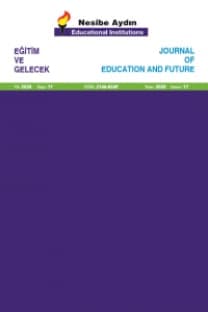Toplam Değerlendirmenin Yoksunluğunun Öğrencilerin Motivasyon ve Öğrenme Üzerindeki Etkilerinin Yansımaları
Değerlendirme, toplam değerlendirme, öğrenme
Reflections on the Impact of Absence of Summative Assessment on Students’ Motivation and Learning
Assessment summative assessment, motivation, learning,
___
- Airasian, P. W.1994. Classroom assessment (2nd ed.). New York: McGraw-Hill.
- Austin, S., & McCann, R. 1992. Here’s another arbitrary grade for your collection. A statewide study of grading policies. Paper presented at the annual meeting of the American Educational Research Association, San Francisco, CA.
- Anderman, E. M., & Johnston. 1998. Television news in the classroom: what are adolescents learning? Journal of Adolescent Research, 13, 73-100.
- Betts, J. R. 1997. Do grading standards affect the incentive to learn? Working Paper. University of California, San Diego.
- Black, P., William, D. 1998. Inside the Black Box: Raising Standards Through Classroom Assessment (Electronic Version). Phi Delta Kappan Online, 80 (2): 139-148. Retrieved March 15, from http://www.pdkint.org/kappan/kbla9810.htm
- Bloom, B. S., Madaus, G. F., & Hastings, J. T. 1981. Evaluation to improve learning: Theory and practice. New York: Holt, Rinehart & Winston.
- Boud, D., and Associates 2010. Assessment 2020: seven prepositions for assessment reform in higher education, Australian Learning and Teaching Council, Sydney. http://www.olt.gov.au/resource-student-assessment-learning-and-after-courseots-2010.
- Butler, R., & M. Nisan. 1986. Effects of no feedback, task-related comments, and grades on intrinsic motivation and performance. Journal of Educational Psychology, 78: 210-216.
- Butler, R. 1987. Task-involving and ego-involving properties of evaluation Effects of different feedback conditions on motivational perceptions, interest, and performance. Journal of Educational Psychology, 79, 474-482.
- Butler, R. 1988. Enhancing and undermining intrinsic motivation: the effects of task-involving and ego-involving evaluation on interest and involvement. British Journal of Education Psychology, 58: 1-14.
- Condry, J., & Koslowski, B. 1977. Can education be made intrinsically interesting to children? Clearinghouse on Early Childhood Education. Washington, D. C: National Institute of Education.
- Deci, E. L., & Ryan, R. M. 1987. The support of autonomy and the control of behavior. Journal of Personality and Social Psychology, 53, 1024-1037.
- Dev, P.C. 1997. Intrinsic motivation and academic achievement. Remedial and Special Education, 18 (10) 12-19.
- Dörnyei, Z. 1998. Motivation in second and foreign language learning. Language Teaching, 31: 117-135. http://journals.cambridge.org/abstract_S026144480001315X .
- Dörnyei, Z. 2009. ‘The L2 Motivational Self System’ in Z.D. and E. Ushioda (eds). Motivation, Language Identity and the L2 Self. Clevedon: Multilingual Matters.
- Guskey, T. R. 2000b. Twenty questions! Twenty tools for better teaching. Principal Leadership, 1(3), 5-7.
- Guskey, T. R. 2002. Computerized grade books and the myth of objectivity. PHI DELTA KAPPAN, 83(10) 775-780, June 2002.
- Guskey, T. R. 2003. How Classroom Assessments Improve Learning (Electronic Version). Eduational Leadership, 60 (5), 6-11.
- Guskey, T. R. 2006. It wasn’t fair! Educators’ recollections of their experiences as students with grading. Paper presented at the annual meeting of the American Educational Research Association, San Francisco.
- Grolnick, W. S., & Ryan, R. M. 1987. Autonomy in children’s learning: An experimental and individual difference investigation. Journal of Personality and Social Psychology, 52, 890-898.
- Harlen, W., & Deakin, C. R. 2002. A systematic review of the impact of summative assessment and tests on students’ motivation for learning (EPPI-Centre Review, version 1.1).
- Harlen, W., & Crick, R. D. 2003. Testing and motivation for learning. Assessment in Education. 10 (2), 169-207.
- Hattie, J. 1992. Enhancing Self-concept. In John Hattie. Self-concept. Hillside, NJ: Erlbaum. www.books.google.com.tr/books?isbn=0791453340.
- Hoyenga, K. B., & Hoyenga, K. T. 1984. Motivational Explanations of Behavior. Monterey, CA: Brookes/Coles Publishing Company.
- Ilgen, D.R., & Davis, C. A. 2000. Bearing bad news: Reactions to negative performance feedback. Applied Psychology: An International Review, 49 (3), 550-565.
- Kluger, A. N., & DeNisi, A. 1996. The effects of feedback interventions on performance: Historical review, a meta-analysis and a preliminary feedback intervention theory. Psychological Bulletin, 119, 254-284.
- Köller, O. 2005. ‘Formative assessment in classrooms: a review of the empirical German literature’. N: OCDE. Formative assessment: improving learning in secondary classrooms. Centre for Educational Research and innovation (CERI).
- Marzano, R. 2000. Transforming classroom reading. Alexandria, VA: Association for Supervision and Curriculum and Development.
- Oosterhof, A. 2001. Classroom applications of educational measurement. Upper Saddle River, NJ: Merill Prentice Hall.
- Pike, D. L. 2011. The tyranny of dead ideas in teaching and learning: Midwest Sociological Society presidential address 2010. The Sociological Quarterly, 52 (1), 1-12. http://onlinelibrary.wiley.com/doi/10.1111/j.1533-8525.2010.01195.x/pdf .
- The Assessment Reform Group, http://www.aaia.org.uk/afl/assessment-reform-group/ , 03.04.2014
- Schraw, G., Horn, C. Thorndike-Christ, T. & Brunning, R. H. 1995. Academic goal orientations and student classroom achievement. Contemporary Educational Psychology, 20, 359-368.
- Motivation and performance in college students enrolled in self-paced versus lecture-format remedial mathematics courses.
- Stiggins, R. J. 2002. Assessment crisis! The absence of assessment FOR learning. Phi Delta Kappan, 83(10), 758-765. https://www.google.com.tr/#q=stiggins+2002 .
- Stiggins, R. J. 2005. Students –Involved Assessment FOR Learning. New Jersey: Pearson Prentice Hall.
- Wrinkle, W.L. 1947. Improving marking and reporting practices in elementary and secondary schools.
- https://openlibrary.org/works/OL7517319W/Improving_marking_and_reporting_practices_in_elementary_and_secondary_schools . 03.04.2014
- ISSN: 2146-8249
- Yayın Aralığı: 1
- Başlangıç: 2012
- Yayıncı: Nesibe Aydın Eğitim Kurumları
Abdullah Erdem Canda Murat Keske
Abdullah CANDA, Murat KESKE, Muhammed ARSLAN
Sınıf İçi Bir Proje Örneği: Aktif Öğrenme ve Etkin Katılım
Nuray BOZYİĞİT, Talya SERENADA ONAN, Ayşe ÖZÇINAR, Aliye ERDEM
Örgütlerde Tiyatro Metaforu ve Hizmet İçi Eğitimde Uygulanışı
Eğitim Alanında Performans Değerlendirme Sistemine İlişkin Okul Yöneticilerinin Görüşleri
Tarık SOYDAN, Hüseyin ABALI, Cemal KALSEN
Evaluation made to the first part of Adnan Saygun's 1st Symphony
Lise 1. Sınıf Türk Öğrencilerinin Algısal Öğrenme Stili Tercihleri
İhsan METİNNAM, Serkan KELEŞOĞLU, Zeki ÖZEN
